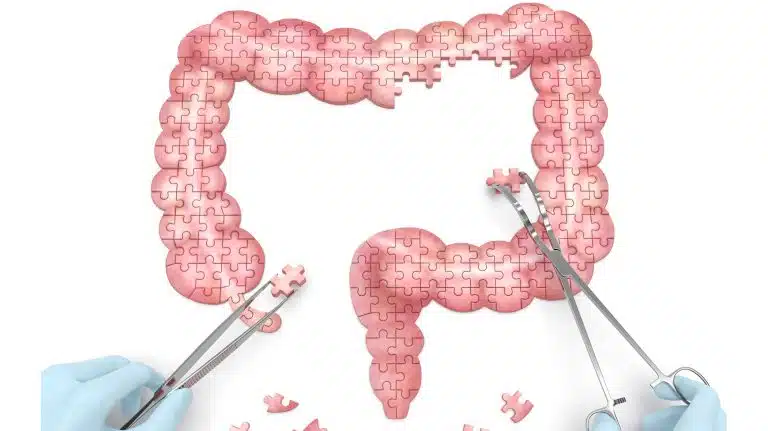Alcohol & Ulcerative Colitis (UC) | Is There A Link?

Alcohol use is linked to a higher risk of ulcerative colitis, an inflammatory bowel disease (IBD) where ulcers form in the colon (large intestine). Drinking alcohol can cause inflammation and increased permeability, which can cause harmful substances to enter the intestines easier.
Alcohol’s effects on the body are widespread, and the link between alcohol and inflammatory bowel diseases is still not clear. Most research points to staying away from alcohol as a way to decrease your risk of IBDs.
Potential Links Between Alcohol & Ulcerative Colitis (UC)
Alcohol’s link to ulcerative colitis and other inflammatory bowel diseases is due to a number of factors.
Drinking alcoholic beverages can cause flare-ups of disease activity for IBDs that were there, but not causing any symptoms. Alcohol may also lead to an increased risk of developing UC.
Not all inflammatory bowel disease patients experience symptoms all the time. Many have an inactive form of IBD. UC flare-ups after drinking alcohol may be due to alcohol weakening the immune system, which can then lower your chances of fighting off diseases.
Alcohol can cause inflammation in the gut similar to the effects of UC. Alcohol may also increase the permeability of the small and large intestines, which is a risk factor in many IBDs.
Can Alcohol Help Inflammatory Bowel Disease Patients?
One study showed that moderate alcohol consumption in patients with IBD symptoms actually decreased their symptoms instead of worsening them. Few other studies, if any, backed up these findings.
Other ingredients in alcoholic drinks may also play a role in inflammatory bowel disease activity. Sulfites and sugars, two common ingredients in alcoholic drinks, are also linked to flare-ups of IBD activity in some studies.
The disease course of ulcerative colitis and IBDs may be affected by many environmental factors, such as dietary changes and the environment itself. More research may be needed to find alcohol’s role in IBDs.
Symptoms Of Ulcerative Colitis
Some of the negative effects of UC you may experience after drinking alcohol can include:
- abdominal pain
- rectal bleeding
- weight loss
- anemia (low iron content in the blood)
- skin sores
If you experience these effects, you may want to contact your doctor about a potential inflammatory bowel disease. Ignoring constant symptoms can eventually lead to hospitalization if the IBD continues to progress and becomes severe.
Treatment For Ulcerative Colitis & Other IBDs
If you suffer from an IBD such as ulcerative colitis or Crohn’s disease, avoiding alcohol can be a good way to reduce your symptoms. Constant alcohol use can both worsen your symptoms and put you at an increased risk for other health concerns.
Severe cases of UC often need hospitalization. Hospitalized patients may need to be treated for signs of infection, severe inflammation, frequent and bloody stools, and other symptoms.
Many IBDs do not have cures, but medications and dietary changes may be prescribed to suppress symptoms. Your doctor may ask about your history of alcohol use and may advise you to stay away from alcohol to avoid a flare-up of symptoms.
Avoiding The Negative Effects Of Alcohol
If you have a hard time controlling your alcohol consumption, ulcerative colitis may not be the only condition that you are at risk for. Chronic alcohol abuse is linked to higher rates of heart disease, other forms of IBDs, higher chances of accidents, and decreased mental health.
Even if you know of alcohol’s negative effects, it can be hard to quit. To improve your drinking habits and your overall quality of life, you may want to look at alcohol treatment options.
To find the best alcohol abuse treatment available for you or your loved one, contact us today.
Written by Ark Behavioral Health Editorial Team
©2024 Ark National Holdings, LLC. | All Rights Reserved.
This page does not provide medical advice.
Annals of Gastroenterology - Alcohol and narcotics use in inflammatory bowel disease | Annals of Gastroenterology
Karger Publishers - Is Moderate Red Wine Consumption Safe in Inactive Inflammatory Bowel Disease?
National Library of Medicine: MedlinePlus - Ulcerative Colitis | UC
PubMed Central - Pattern of Alcohol Consumption and its Effect on Gastrointestinal Symptoms in Inflammatory Bowel Disease
PubMed Central - Strategies for the Care of Adults Hospitalized for Active Ulcerative Colitis

Questions About Treatment?
Ark Behavioral Health offers 100% confidential substance abuse assessment and treatment placement tailored to your individual needs. Achieve long-term recovery.
100% confidential. We respect your privacy.
Prefer Texting?
Our friendly support team is here to chat 24/7. Opt out any time.







 Learn More
Learn More








